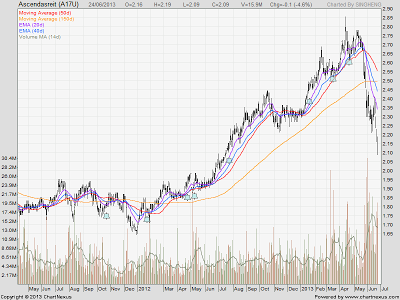Today REITS listed in the Singapore stock market are declining again. This is a screenshot i took from SGX
This is getting unbelievable as reits has fallen over 20% in the last few weeks. Today the top declining reit is Suntec with a fall of 4.56% in a single day.
Let's take a look at some charts:
They do look like they are jumping off a cliff and still in a free fall mode. All of the big names like suntec, mapletree are officially below the 200DMA which is the long term trend line.
Why has it fallen so much? This is mainly due to the concern of an increase in interest rates in the US. In fact if you track the interest rates in the US, it has already risen by a lot. Even interest rates in Singapore are rising. REITS are highly leveraged in a sense they borrow a lot of money sometimes about 30% of their equity. Once interest rates goes up, they are faced with higher loan interest payable. Two rates to track in Singapore is the Singapore interbank offer rate (SIBOR) and Singapore Swap Offer rate (SOR). Bonds are being sold off aggressively both in the US and Singapore causing yields to go up. Bond prices and yields move in the opposite direction.
Below is a chart of the 3 month SIBOR rate for the past 12 months ending may 2013:
This is the rate that banks lend to each other. Local housing loan interest rates track movements to the SIBOR. If this is increasing, home loans interest rates are increasing in Singapore also. Those taking up a housing loan have to watch out. Either take a fixed rate loan or take a loan from HDB which offer a fix rate at 2.6% currently.
Below shows a comparison of the 3 month SOR vs the 3 month SIBOR:
This is the average cost of funds used by banks in commercial lending. In Singapore most banks offer housing loan packages either pegged to the SOR or SIBOR. This is like a "cost price" to them and they add a margin to earn a spread.
The essential cost of the rising interest rates globally and in SG is the potential ending of QE in US.
You can read my previous post on QE and why it affects interest rates here:
Quantitative Easing - how it affects the economy and the stock market?
Elsewhere in the biggest asian country, China, they are facing a possibility of a credit crunch. There are fears that the china banking system may run out of cash soon and face liquidity problems. Shortage of funds cause banks to raise interest rates. China key stock index closes down 5.30% today as reported by channel news asia.
The recent market correction is an opportunity for bargain hunting of good stocks. Choose stocks which are not highly leveraged on debts and have cash to invest and ride on the recovery in the economy. Examples are shipping and industrials. In fact, banks will also benefit from the increase in interest rates as they can charge a higher interest rates on their loans and transfer the risk to borrowers. The only worry is that there will be people who will default on their loans due to over borrowing.
I have been anticipating this interest rate movement since last year. This is a good experience for me to see what happens and learn from it.






No comments:
Post a Comment